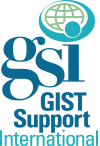Dasatinib (Sprycel), formerly BMS-354825
Dasatinib (brand name Sprycel), formerly known as BMS-354825, has been developed by Bristol-Myers Squibb. It is a potent oral multi-kinase inhibitor that targets ABL, SRC, KIT, PDGFR, and other tyrosine kinases.
Dasatinib was approved by the FDA on 6/28/2006 for use in those patients with chronic myeloid leukemia or acute lymphoblastic leukemia who have developed resistance or intolerance to imatinib (Gleevec). You can read about Sprycel’s FDA approval for leukemia at the FDA site. An approved drug could be prescribed off-label for GIST at the discretion of a physician.
Potential Effectiveness for Certain GIST Mutations
Dasatinib is structurally unrelated to imatinib, possibly demonstrating a higher binding affinity to KIT, regardless of the conformation of the KIT activation loop. It inhibits KIT autophosphorylation and KIT-dependent activation of downstream pathways including RAS/MAPK, PI3K/AKT, and STAT3.
Preclinical cell studies by Shah et al (2006) indicate that dasatinib may inhibit the KIT D816V mutation that is resistant to imatinib. Shah et al suggest dasatinib may therefore be useful in treating systemic mastocytosis. Additional preclinical studies by Schittenhelm et al (2006) indicate effectiveness against KIT activation loop mutations D816Y and D116F as well as D816V. Therefore, dasatinib may potentially be useful against imatinib-resistant GISTs harboring these certain activation-loop mutations.
An additional imatinib-resistant mutation for which dasatinib may be effective according to cell studies is the PDGFRA mutation D842V, as described in the following paper now free-access: Dewaele et al, 2008.
For a lay-language summary about KIT inhibition and dasatinib, link to Eurekalert.
Clinical Trials Relevant to GIST Patients
Some GIST patients have enrolled in a clinical trial testing dasatinib in solid tumors. The trial, which is ongoing but no longer recruiting, is:
Trial of Dasatinib in Advanced Sarcomas (SARC009)
The SARC009 dasatinib results presented in 2009 indicated that 30% of the GIST patients in the trial had at least 6 months of progression-free survival at that time point (May 2009).
In 2011 a presentation at ASCO provided an update on the results for GIST patients in the SARC009 trial. 21% of patients were progression-free for longer than 6 months.
A phase II study of dasatinib for patients with imatinib-resistant gastrointestinal stromal tumor (GIST). Authors: J. Trent et al.
2011 ASCO Annual Meeting Abstract No:10006
Citation: J Clin Oncol 29: 2011 (suppl; abstr 10006)
A trial open in locations in Europe is:
Dasatinib as First-Line Therapy in Treating Patients With Gastrointestinal Stromal Tumors

